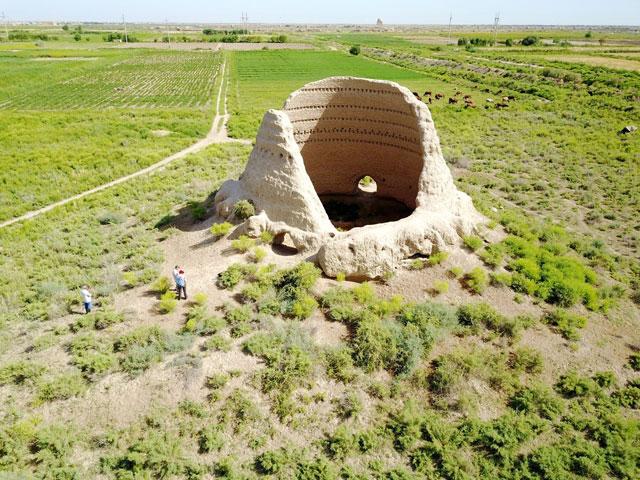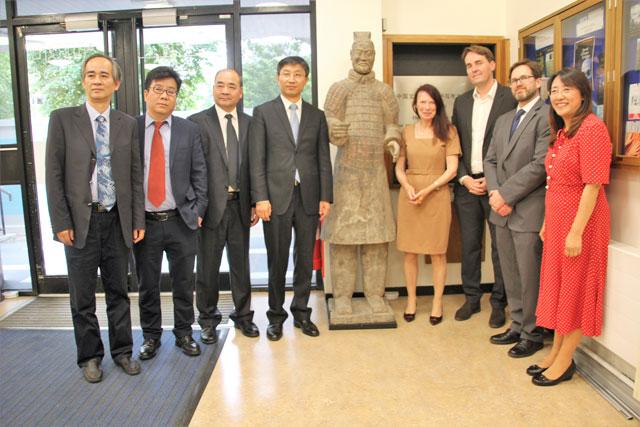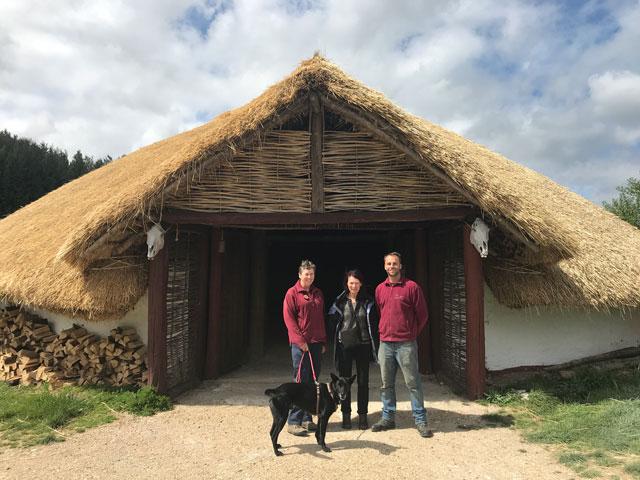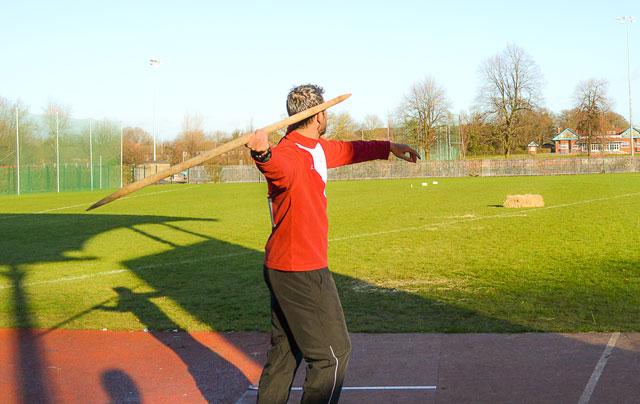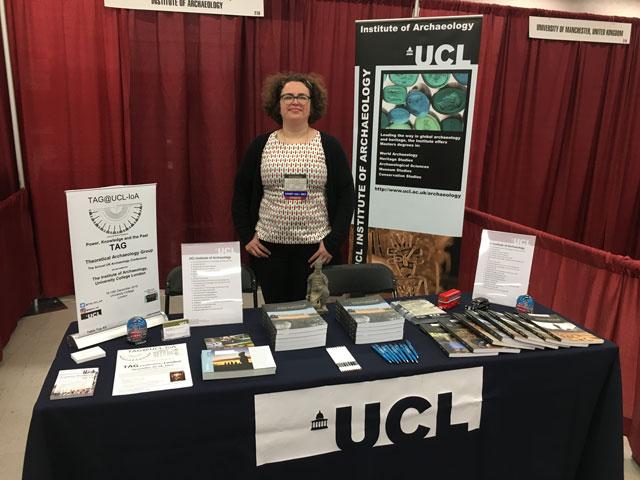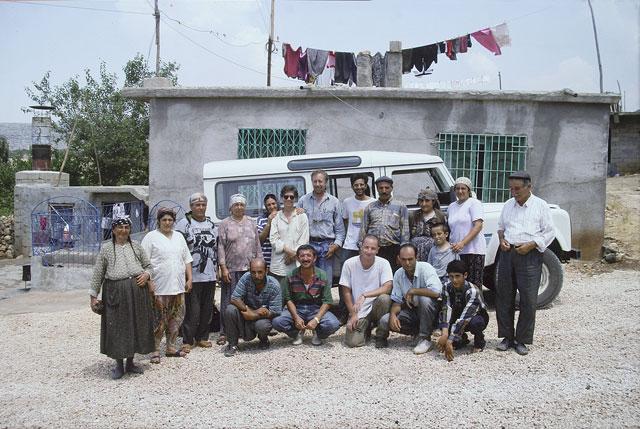Welcome to the Director’s Report for the UCL Institute of Archaeology (IoA) and to Archaeology International for the academic year 2018–19. We have recently changed the organisational structure of Archaeology International to better oversee its production, content and format. This has been achieved with the creation of an Editorial Board that includes the Co-Heads of each of our three Sections (Archaeological Sciences, Heritage Studies, and World Archaeology) as members. This year Andrew Reid, Senior Lecturer in Eastern African Archaeology, is the Editor, supported by Jennifer French (Leverhulme Trust Early Career Fellow) as regular Features Editor, and Barney Harris (recently-completed PhD student) as copy editor and Secretary to the Editorial Board.
The IoA has had another eventful and productive academic year. Below, I present a substantial number of highlights that affirm our breadth in teaching, research and dissemination of our work in the wider world.
Alongside this, our facilities are being significantly upgraded, particularly the ongoing renewal and expansion in our Archaeological Science provision. We provide exceptional facilities for the examination and analysis for almost all types of archaeological materials, artefacts and finds, both organic and inorganic. Our Hitachi S3400 SEM has been upgraded with a new Oxford Instruments Ultim Max 65 EDS detector which has completely removed the need to use liquid nitrogen in the Wolfson Laboratories. A Euroteck X-ray cabinet equipped with a Gulmay MP1 controller and DÜR NTD digital flat panel detector and plate scanner has been purchased, together with a Future Tech FM-310 Vickers’ micro-hardness tester and a new Brilliant 250.3 Automatic Metallurgical Precision saw. These will expand our capabilities in materials sampling and testing. Further ‘state of the art’ analytical equipment acquisitions are currently being installed including a Thermo fisher DELTA V Advantage Mass Spectrometer (essential for establishing isotopic ratios in very small samples; this means we can start to look at diet and environmental signals in human and animal teeth at a sub-seasonal scale rather than a life-time scale), Laser Ablation Inductively Coupled Mass Spectrometer (LA-ICP-MS, the gold standard in measuring artefact chemistry), and Portable Raman spectroscopy (widely used to identify molecules in minerals, corrosion products, and biological materials).
Promotions, New Academic Staff, and Leavers
The IoA is pleased to announce the success of Manuel Arroyo-Kalin and Julia Shaw in UCL’s Senior Staff Promotions. Manuel and Julia are both promoted to Associate Professor (effective 1 October 2019).
We welcomed alumni Mike Charlton and Miljana Radivojevic back in September 2018 to take up new Lectureships in Archaeomaterials. Mike’s expertise covers archaeological material science and quantitative methods while Miljana’s main research interests involve the origins of metallurgy, Balkan and Silk Roads archaeology. Rhiannon Stevens, who currently leads an ERC research grant on Colonisation and Cultural Diversification in Unfamiliar Landscapes (UP-NORTH) exploring the relationship between climate change and human behaviour, was appointed to a Lectureship in Archaeological Sciences (‘Isotopic Archaeology’).
We are sad to say goodbye to Ignacio de la Torre (Professor of Palaeolithic Archaeology) and to James Hales (Senior Teaching Fellow in Conservation). Ignacio will return to Spain to take up a position as a tenured scientist in Madrid at the Spanish Research Council (CSIC) but will continue to supervise his PhD students and retain a strong link to the IoA. James will leave us at the end of October 2019 to pursue a change in career path. Both members of staff have worked at the IoA for many years and will be sorely missed by colleagues and students alike. We thank them both for their enormous service to the IoA and UCL.
After 21 years’ service, our Buildings Officer, George Davies, retired in April 2019. He is already a much-missed colleague and we thank him for his exceptional commitment and service.
Awards and Recognition
IoA staff, honorary associates and students, both individually and for specific projects, have been recognised through an impressive array of awards and related indicators, including media interest.
David Wengrow was awarded the Distinguished Visitor Award for 2019 by the University of Auckland, New Zealand.
A new study, jointly led by Tomos Proffitt (British Academy Postdoctoral Research Fellow), was published in Nature Ecology & Evolution, June 2019, and has shown that a group of wild monkeys, bearded capuchins, have been employing stone tools for around 3,000 years, and their use of the technology has changed over this period. This research contributes to a growing understanding that other animals also possess an identifiable archaeological record and an ancient material culture. Tomos’ collaborative research also featured in the British Academy Summer Showcase 2019.
The journal article Social responses to climate change in Iron Age north-east Thailand: new archaeobotanical evidence, an output from the Early Rice Project was the joint recipient of the Ben Cullen Prize from Antiquity for 2019. The paper was published last year by a co-authorship team led by Cristina Castillo, together with Katie Miller (MSc Environmental Archaeology, 2014) and Dorian Fuller from the IoA.
Bill Sillar joined the panel of experts for an episode of the BBC Radio 4 programme ‘In Our Time’, hosted by Melvyn Bragg, on the Inca of South America who dominated from the Andes to the Pacific coast until the arrival of the Spanish Conquistadors:
https://www.ucl.ac.uk/archaeology/news/2019/jun/bill-sillar-interviewed-bbc-r4-inca
Collaborative work by UCL and Terracotta Army Museum researchers found that the chrome plating on the Terracotta Army bronze weapons, once thought to be the earliest form of anti-rust technology, in fact derives from a decorative varnish.
https://www.ucl.ac.uk/archaeology/news/2019/apr/preservation-mystery-terracotta-army-weapons-solved
Collaborative research, involving Institute researchers, published in Antiquity, discovered the first empirical evidence of cloves and black pepper to be found in Sri Lanka, suggesting that exotic spice trade in the region dates back to as early as 600 AD.
Another new study involving IoA researchers, also published in Antiquity, found that bones in the feet of Neolithic cattle demonstrated distinctive wear patterns, indicative of exploitation as ‘animal engines’. This research stems from the European Research Council funded project EUROFARM, which was awarded to Marc Vander Linden and hosted by the IoA from 2012–17. This has major ramifications for our understanding of animal use in the Neolithic.
https://www.ucl.ac.uk/archaeology/news/2018/dec/earliest-evidence-animal-engines
IoA research student, Pauline Harding, was the winner of the London Arts and Humanities Partnership (LAHP) photographic competition 2019 at their Annual Research Day. Pauline’s entry was of the Ndere Troupe which was established in the 1980s partly to keep Uganda’s cultures strong among its fast-growing, youthful population.
IoA students were awarded Faculty and departmental prizes for the 2017–18 academic session, featuring on the Dean’s List of Excellence.
https://www.ucl.ac.uk/archaeology/news/2018/dec/prizes-awarded-institute-students-2018.
IoA students Harry Platts and Victoria Ziegler were awarded Society for Medieval Archaeology prizes for the best dissertations of 2017.
Funding Awards for New Research
Several of our staff have had their outstanding international research activities recognised by external funding and institutional awards, of which a small selection is mentioned here.
The British Academy awarded funding to Manuel Arroyo-Kalin this year, under its Sustainable Development Programme, to pursue research designed to help tackle the United Nations’ Sustainable Development Goals. Manuel’s collaborative project, Memorialising Ancestral Landscapes through Inter-Cultural Heritage Making in the Brazilian Northwest Amazon, involves researchers from the Federal University of São Carlos (UFSCAR), the Instituto Socioambiental (ISA), the Museu da Amazônia (MUSA) and Museu Paraense Emílio Goeldi-MCTI (MPEG) in Brazil, and seeks to foster a reflexive practice of Indigenous Heritage Making in the Negro River Indigenous Area, Northwest Amazon, an area inhabited by ethnically-diverse indigenous peoples.
Congratulations to Jeremy Tanner who has been awarded a Leverhulme Trust Major Research Fellowship to undertake a research project on The Axial Age and the Institution of Art in Ancient Greece and China. This will explore major parallel transformations in ancient Greek and early imperial Chinese art, from the development of ‘naturalism’ to depict character and emotion in narrative art to the invention of practices of art history writing. The fellowship has allowed us to appoint a teaching replacement for the duration of Jeremy’s time away and we are pleased to announce that Eva Mol has been appointed to the post of Teaching Fellow in Classical Art and Archaeology for three years from September 2019.
Congratulations to Ignacio de la Torre for his award of a European Research Council Advanced Grant to undertake innovative research on the dynamics of earliest human occupation. The project involves an exceptionally diverse range of disciplines from geochemistry to niche modelling.
https://www.ucl.ac.uk/archaeology/news/2019/mar/ignacio-de-la-torre-awarded-erc-advanced-grant
Amara Thornton, History of Archaeology Network Coordinator at the IoA, received a CBRL Centennial Award for a project on the first intensive excavations at Petra, which took place 90 years ago this year. The project output, a website www.petra1929.co.uk, features a digital transcription of key documentation relating to this excavation and associated contextual essays and indexes situating the 1929 excavations in a broader historical context.
https://www.ucl.ac.uk/archaeology/news/2019/jan/petra-1929
Colin Sterling was awarded an AHRC Leadership Fellowship (Early Career) for his research on New Trajectories in Curatorial Experience Design.
Alice Stevenson was awarded AHRC Follow on Funding for Impact and Engagement for her project Egypt’s Dispersed Heritage: Views from Egypt which follows on from the AHRC-funded project on Artefacts of Excavation.
The Central Asian Archaeological Landscapes (CAAL) project (Figure 1), made possible by the generosity of Arcadia – a charitable fund of Lisbet Rausing and Peter Baldwin – was launched at the IoA in February. The project, led by Tim Williams (Figure 2), is dedicated to the digitisation of archaeological heritage/endangered archaeology across a vast region that stretches from the Caspian Sea to western China and encompasses the Republic of Kazakhstan, Kyrgyz Republic, Republic of Tajikistan, Turkmenistan, Republic of Uzbekistan, and the Xinjiang Uyghur Autonomous Region of China (Figure 3).
Yijie Zhuang with Hai Zhang (Peking University) was awarded a British Academy Newton Advanced Fellowship for research on Water and early enclosed settlement on the Huai floodplain, central China: Geoarchaeology of water management and landscape of the late-Neolithic site of Pingliangtai.
In addition, we signed Phase II of our collaborative agreement and associated funding with the University of Gothenburg for the joint UCL-UGOT Centre for Critical Heritage Studies (2019–22).
As in previous years, we continue to obtain a steady stream of small grants and grants-in-kind to support collaborative fieldwork and post-excavation analyses including:
Mark Altaweel for the Peshdar Plain Chalcolithic Project;
Corisande Fenwick for ongoing research at Volubilis;
Mike Parker Pearson for his ongoing Origins of Stonehenge project;
Tomos Proffitt for his research on The capuchin Stone Age and the emergence of human technology;
Andrew Reynolds for research on the Early Medieval Maritime Landscape of Mersea Island, Essex;
Corinna Riva for her project Sustainable Vulci: The Economy and Palaeoenvironment of a City-State in the pre-Roman Mediterranean;
Rhiannon Stevens for various projects involving stable isotope analysis including Seeking Neanderthal fossils at Coygan Cave using ZooMS, Exploring status linked childhood diets using single amino acid isotope analysis and also Hunting for Neanderthal and Human Fossils at the Periphery of Palaeolithic Europe.
We have also had several UCL institutional funding successes this year including:
Mark Altaweel for research on Forecasting Water in the Future of Iraq (UCL Knowledge Exchange and Innovation Fund);
Stuart Brookes for a project to update the database created during the Leverhulme Trust funded Beyond the Tribal Hidage project and to improve access in the public domain (UCL SHS Dean’s Strategic Reinvestment Fund: Seeding and Harvesting Research Small Grants);
Rachel King for research on The changing place of migration in archaeological thought in Africa, from the 19th century to the present day (UCL-University of the Witswatersrand (Wits) Seed Funds);
Renata Peters for her collaborative project with colleagues in Brazil on Fibres of resistance: Tikuna barkcloth and identity in the Amazon (UCL Global Engagement Funding).
Additionally, our Centre for Critical Heritage Studies has continued with its Small Grants Scheme for UCL academic staff or doctoral/postdoctoral researchers for projects that lead to, or support, collaborative research on critical heritage studies.
Recognition by Research Bodies and the Discipline
Dorian Fuller was invited to give a lecture at the Czech Academy of Sciences, Prague, and participate in an expert-led workshop in Vienna on his world-leading research on the evolution of agriculture:
Under the Memorandum of Understanding between both institutions, IoA staff participated in the World Archaeology programme at Northwest University, China (NWU) as part of an agreed teaching exchange. This year, four members of staff, Dorian Fuller, Renata Peters, Dominic Perring and Thilo Rehren, visited NWU and gave talks in their specialist fields.
David Wengrow was invited to join a panel of experts at the York Festival of Ideas 2019 to discuss what lessons can be learnt from the history of social inequality:
https://www.ucl.ac.uk/archaeology/news/2019/jun/inequality-lessons-history
The EC-funded Big Picnic project, involving Theano Moussouri engaged with a wide range of audiences across the EU on the topic of food security. The recommendations of the project will support policy-makers and informal learning sites.
https://www.ucl.ac.uk/archaeology/news/2019/mar/bigpicnic-policy-recommendations-now-available
Yijie Zhuang was invited to give the Elsley Zeitlyn Lecture on Chinese Archaeology and Culture 2019 at the British Academy in February. His presentation was entitled Dams, moats, and cities: climate and societies in late-Holocene China.
Special Events
The IoA hosts and generates numerous events on many different aspects of archaeology and is linked to other heritage institutions, archaeological societies and organizations, providing an outstanding research environment for staff, students and visitors. A selection of events over the past year are highlighted.
The AHRC Heritage Priority Area team (led by AHRC Heritage Priority Area Leadership Fellow, Rodney Harrison) organised multiple events this year including:
-
–September 2018: In the context of the AHRC Heritage Research Deterritorialising the Future programme, Arts Catalyst artist-in-residence Tuguldur Yondonjamts was in conversation with archaeologist Denis Byrne at the IoA. https://www.ucl.ac.uk/archaeology/events/2018/sep/conversation-tuguldur-yondonjamts-and-denis-byrne
-
–October 2018: A lecture by Marcy Rockman (ICOMOS Climate Change and Heritage Working Group) on Heritage and Climate Change: The Power of Archaeological Thinking for addressing Modern Problems. https://www.ucl.ac.uk/archaeology/events/2018/oct/heritage-and-climate-change-power-archaeological-thinking-addressing-modern-problems
-
–October 2018: (with Rescue: The British Archaeological Trust), a one-day conference addressing the challenges and opportunities resulting from changes in policy which impact the culture, arts and heritage sectors, as well as the role organisations and civil society can take to shape policy in Government. https://www.ucl.ac.uk/archaeology/news/2018/sep/engaging-policy-uk-responding-changes-planning-heritage-and-arts
-
–July 2019: A symposium, with the German Historical Institute of London, on Rethinking Heritage through Counter-Archives. https://www.ucl.ac.uk/archaeology/news/2019/jul/ruins-preservation
Below is a list by month of some of the other major IoA based or led events of the 2018–19 academic year:
October 2018
Michael Wood (University of Manchester) presented the 10th Annual Sir David Wilson Lecture in Medieval Studies in October on ‘The Lady of the Mercians 918–2018’. This lecture marked the first event in the 2018–19 Institute of Archaeology/British Museum Medieval Seminar Series.
IoA staff organised, and participated in, a series of dialogues, aimed at considering archaeology as an original perspective from which we can look at the social, economic and cultural complexities of our society. These events, organised by Corinna Riva and Andrew Gardner, and hosted by the Italian Cultural Institute London, included distinguished Italian and British archaeologists who debated topics including Roman Imperialism and Europe; Archaeology and Localisms and Medieval Archaeology and Islam. The series was sponsored by Accordia, the Institute of Classical Studies, London and the British School at Rome.
https://www.ucl.ac.uk/archaeology/news/2018/oct/dialogues-medieval-archaeology-and-islam
Elizabeth Baquedano organised a one-day symposium on Featherwork in Ancient Mexico.
https://www.ucl.ac.uk/archaeology/events/2018/oct/featherwork-ancient-mexico-moctezumas-headdress
November 2018
An Inaugural Student/Staff Fieldwork Conference was held at the IoA:
https://www.ucl.ac.uk/archaeology/events/2018/nov/ioa-studentstaff-fieldwork-conference-2018
December 2018
The 3rd annual meeting of the Central Asian Seminar Group, in partnership with the International Centre for Silk Roads Archaeology and Heritage, was held at the IoA, with the theme ‘Landscapes of Diversity: Art, Ideology and Survey in Central Asia.’
https://www.ucl.ac.uk/archaeology/events/2018/dec/central-asian-seminar-group-meeting-2018
The Heritage Futures exhibition, How can we create the future together?, an outcome of the 4-year, AHRC-funded, Heritage Futures Research Programme directed by Rodney Harrison, was launched at the Manchester Museum in December and is the centrepiece of the museum’s major two year redevelopment programme hello future. The exhibition will run until Autumn 2021.
January 2019
The International Centre for Chinese Heritage and Archaeology (ICCHA) Special Guest Lecture 2019 was presented by Kazuo Miyamoto (Kyushu University, Japan) at the IoA on the topic ‘Rethinking the Bronze Age on the Eastern Rim of the Tibetan Plateau’.
February 2019
The 5th Islamic Archaeology Day, jointly hosted by SOAS and UCL at the IoA, involved presentations on the latest archaeological research across the Islamic world.
https://www.ucl.ac.uk/archaeology/events/2019/feb/islamic-archaeology-day-2019
The IoA hosted a seminar series, focusing on topics linked by a common theme Diversification in Human Evolution Studies.
The 6th Annual Workshop on Maya Myths and Glyphs: Maya on the Thames 2019 was held at the IoA.
https://www.ucl.ac.uk/archaeology/events/2019/feb/maya-thames-2019
The 5th Annual UCL Lecture on Climate and Human History was sponsored by the UCL Past Climates Group, Department of Geography and the IoA’s Archaeological Sciences Section. This year’s speaker Robin Dennell (Department of Archaeology, University of Exeter) gave a presentation entitled ‘Climate and Human History: Past Responses to a Warmer World.’
An exhibition, Dust to Dust: Redesigning Urban Life in Healthy Soils resulting from the international AHRC-funded Pre-Colombian Tropical Urban Life (TruLife) research network, involving Elizabeth Graham (IoA), opened in November at the University of East Anglia, ran until February 2019.
https://www.ucl.ac.uk/archaeology/news/2018/nov/dust-dust-redesigning-urban-life-healthy-soils
March 2019
The CROSSDEM 2019 workshop – which explored cross-disciplinary approaches to prehistoric demography – was hosted by the IoA.
The UCL Centre for Critical Heritage Studies held a showcase week to celebrate its work.
https://www.ucl.ac.uk/critical-heritage-studies/events/2019/mar/cchs-showcase-week
The 4th Early Rice Project Symposium took place at the Maharaja Sayajirao University of Baroda, India. This two-day workshop, organised as part of NERC-funded research led by Dorian Fuller, addressed the evolution and impact of rice cultivation systems in South Asia, including issues relating to sustainability and long-term food security.
https://www.ucl.ac.uk/archaeology/news/2019/mar/rice-workshop-2019-vadodara
The exhibition Moving Objects: Stories of Displacement, on display in the UCL Octagon Gallery, was formally launched with an associated symposium (a full report is given in the ‘News’ section of this issue).
April 2019
The symposium ‘Cypriot archaeology, pre-modern material culture, and cultural heritage in the UK’, took place at the IoA (organised by Maria Dikomitou-Eliadou) in conjunction with the High Commission of the Republic of Cyprus in the UK and The British Museum.
May 2019
The President and Council of the Society for Libyan Studies invited participants to attend a panel-discussion ‘Rethinking Rock Art and Social Change in the Sahara’, hosted by the IoA.
https://www.ucl.ac.uk/archaeology/events/2019/may/rethinking-rock-art-and-social-change-sahara
The IoA also hosted the interdisciplinary conference Trial by Fire, which was concerned with the transformative power of fire and included keynote presentations by Tim Thompson (Teeside University) and Miljana Radivojevic (UCL).
https://www.trialbyfireteam.com/
https://www.ucl.ac.uk/archaeology/events/2019/may/conference-trial-fire
IoA researchers were co-organisers of the conference ‘Digital Heritage in a World of Big Data’, held at the University of Stirling. This was organised as a collaborative event between Rodney Harrison (UCL Professor of Heritage Studies/AHRC Heritage Leadership Fellow), Daniel Pett (Fitzwilliam Museum, University of Cambridge), and Chiara Bonacchi (Lecturer in Heritage in History, University of Stirling), with the intention to create a digital heritage knowledge exchange space for discussion of the role of data and its deeper implications in heritage research.
https://www.ucl.ac.uk/archaeology/news/2019/may/digital-heritage-world-big-data
June 2019
We hosted the annual IAMS Summer School in Archaeometallurgy. The course is aimed at professionals, academics, students, and enthusiasts and covers a diverse range of topics, including mining, metal production, experimental reconstruction, field methods, and the analysis of metallic artefacts.
https://www.ucl.ac.uk/archaeology/events/2019/jun/iams-summer-school-2019
IoA research and public engagement activities and its world-leading collections were on show at the UCL Festival of Culture 2019.
https://www.ucl.ac.uk/archaeology/news/2019/may/institute-expertise-show-ucl-festival-culture-2019
Charlotte Frearson led a Women of Bloomsbury Walk as part of the UCL Festival of Culture. As an IoA Wellbeing Champion with her Pets-as-Therapy dog Indy, she also organised a series of Wellbeing Walks over the summer.
https://www.ucl.ac.uk/archaeology/events/2019/jun/ucl-festival-culture-women-bloomsbury-walk
https://www.ucl.ac.uk/archaeology/events/2019/aug/ucl-institute-archaeology-wellbeing-walks-0
A symposium, organised by the ICCHA on From Villages to Cities was concerned with agricultural production and settlement growth in eastern Eurasia.
Another symposium, The Aztec Royal Court, organised by Elizabeth Baquedano in honour of Cecilia Klein (Emeritus Faculty member at the Cotsen Institute of Archaeology, UCLA), was also held at the IoA in June.
https://www.ucl.ac.uk/archaeology/events/2019/jun/aztec-royal-court
Looking ahead with some excitement to the 2019–20 academic year the IoA will be organising the 41st annual Theoretical Archaeology Group (TAG) Conference in December 2019. The central theme is ‘Power, Knowledge and the Past’ and it is expected to be a crowd-pulling event. The Plenary Session, sponsored by Antiquity, is entitled ‘What is the past good for in the world of 2020?’
https://www.ucl.ac.uk/archaeology/news/2019/apr/announcement-tag-2019-plenary-session
Recognition of Teaching and Support
IoA staff continue to be recognised for their outstanding contribution to the learning experience and success of UCL students in the UCLU Student Choice Teaching Awards 2019, with 44 staff being nominated across the various categories. Amongst these we are especially pleased to congratulate Agnese Benzonelli (Figure 4) for winning the Amazing Support Staff category.
https://www.ucl.ac.uk/archaeology/news/2019/apr/uclu-student-choice-awards-2019.
Delegations, Official Visits, Memorandum of Understanding (MoU)
Here we especially highlight the May 2019 visit by a delegation from Emperor Qin Shihuang’s Mausoleum Site Museum (China) for a renewed signing of our MoU with them for the next five years (Figure 5).
Staff from the IoA and the Emperor Qin Shihuang’s Mausoleum Site Museum (China) at the renewal of the signing of the MoU between the two institutions (from left to right: ZHAO Qiang; SUN Zhouyong; HOU Ningbin; LUO Wenli; Sue Hamilton; Andrew Bevan; Michael Charlton; LI Xiuzhen) (Photo credit: Lisa Daniel).
More recently, we are delighted to announce our new partnership with Butser Ancient Farm, Hants. (led for the IoA by Matt Pope and Bill Sillar) to co-explore teaching, research, and public engagement in ancient technology (Figure 6). We will be welcoming students to Butser in September 2019 for our legendary experimental archaeology, ‘Primary Technologies’ course. https://www.ucl.ac.uk/archaeology/news/2019/jul/ucls-prim-tech-course-moving-butser-ancient-farm-hampshire
Outreach, Public Engagement, and the Media
The IoA’s new student exhibition, ‘An Element of Colour: Shaping self and society’, opened to the public in May 2019. The temporary exhibition created by MA Museum Studies students will be displayed in the A.G. Leventis Gallery of Cypriot and Eastern Mediterranean Archaeology until March 2020. The exhibition explores how we have transformed natural materials and chemical compounds into the colours that we use to express ourselves, our values, and our place in society.
https://www.ucl.ac.uk/archaeology/events/2019/may/element-colour-shaping-self-and-society
An exhibition on the 6th floor of the IoA, entitled ‘Finding Common Ground: IoA Life, Past and Present’ curated by Masters students also opened in May 2019 and explores the physical building, the intersection of many areas of archaeological research, and the shared heritage of those who have been part of the Institute of Archaeology throughout the years.
https://www.ucl.ac.uk/archaeology/events/2019/may/finding-common-ground-ioa-life-past-and-present
Gustav Milne was interviewed in the media in March about his research on evolutionary determinants of health in advance of his UCL Lunch Hour Lecture on ‘Save the Children: containing child obesity from a human evolutionary perspective’.
A new study, also reported in the media and involving Annemieke Milks and Matthew Pope from the IoA, showed that Neanderthals made weapons that could kill from a distance. Published in Scientific Reports, the study examined the performance of replicas of the 300,000 year old Schöningen spears to identify whether javelin throwers could use them to hit a target at a distance. Owen O’Donnell, an IoA alumnus, made the spear replicas (Figure 7).
https://www.ucl.ac.uk/news/2019/jan/neanderthal-hunting-spears-could-kill-distance
Further collaborative research in the media, this time involving the University of Manchester as well as the IoA’s Mike Parker Pearson, and published in the British Journal for the History of Mathematics, showed that the Folkton Drums (a unique set of chalk cylinders, around 5000 years old) could have been used in the construction of monuments such as Stonehenge.
https://www.ucl.ac.uk/archaeology/news/2019/jan/folkton-drums-measuring-devices-stonehenge
Mike was also interviewed on the Jeremy Vine show (BBC Radio 2) in November about the continuing allure of Stonehenge on the occasion of the centenary of public ownership of the historic monument.
https://www.ucl.ac.uk/archaeology/news/2018/nov/mike-parker-pearson-interviewed-bbcr2-stonehenge
A new touring exhibition about Stonehenge, curated by Mike Parker Pearson with Beatrijs de Groot (who recently gained her PhD from the Institute), as Assistant Curator, opened at the Gallo-Roman Museum in Tongeren, Belgium in October 2018. There are plans for it to travel to North America. The exhibition covers the prehistory of Stonehenge from the Mesolithic period to the Early Bronze Age and draws on interdisciplinary research by the ‘Stonehenge Riverside Project’.
https://www.ucl.ac.uk/archaeology/news/2018/oct/stonehenge-beyond-mystery-exhibition
Stephen Shennan was invited to give the 2018 David Clarke Memorial Lecture at the University of Cambridge in November. His presentation was entitled The First Farmers of Europe and the Return of Culture.
Stephen was also invited to speak as part of the Distinguished Lecturer seminar series at the Max Planck Institute for the Science of Human History, Jena, Germany in October, outlining his research on The First Farmers of Europe: An Evolutionary Perspective which was published earlier in the year by Cambridge University Press.
David Wengrow argued that a history of true civilisation is not one of monuments in an article in Aeon (October 2018). Aeon is a unique digital magazine, publishing some of the most profound and provocative thinking on the web.
https://www.ucl.ac.uk/archaeology/news/2018/oct/history-true-civilisation
Matthew Pope was invited to speak at New Scientist Live, the world’s greatest science festival, in September 2018. Matt’s presentation, on the Humans stage, related to Life in the Neanderthal Home.
https://www.ucl.ac.uk/archaeology/news/2018/sep/life-neanderthal-home
Institute news recurrently featured on the UCL news site and includes
New exhibition explores objects, humans and animals in ‘exile’.
https://www.ucl.ac.uk/news/2019/feb/new-exhibition-explores-objects-humans-and-animals-exile
Quarrying of Stonehenge ‘bluestones’ dated to 3000BC
https://www.ucl.ac.uk/news/2019/feb/quarrying-stonehenge-bluestones-dated-3000-bc
Media links: https://www.ucl.ac.uk/news/headlines/2019/feb/stonehenges-bluestones-were-quarried-5000-years-ago
Stonehenge and the solstices
https://www.ucl.ac.uk/news/headlines/2018/dec/stonehenge-and-solstices
Stonehenge discussed (on centenary of public ownership)
https://www.ucl.ac.uk/news/headlines/2018/nov/stonehenge-discussed
Cattle pulled loads 2,000 years earlier than previously thought
https://www.ucl.ac.uk/news/2018/dec/cattle-pulled-loads-2000-years-earlier-previously-thought-0
Media links: https://www.ucl.ac.uk/news/headlines/2018/dec/was-stonehenge-built-cow-power
‘Ancient’ yeast may not be what it seems
https://www.ucl.ac.uk/news/headlines/2019/aug/ancient-yeast-may-not-be-what-it-seems
Abrupt climate change drove early South American population decline
Re-thinking archaeology with sea otters
https://www.ucl.ac.uk/news/headlines/2019/mar/re-thinking-archaeology-sea-otters
The importance of keeping fit for children
https://www.ucl.ac.uk/news/headlines/2019/mar/importance-keeping-fit-children
Pre-Aztec ‘Flayed god’ temple uncovered in Mexico
https://www.ucl.ac.uk/news/headlines/2019/jan/pre-aztec-flayed-god-temple-uncovered-mexico
Open days and evenings
The IoA participated in the UCL Open Day for prospective students in June 2019. We emphasised that Archaeology is a very broad subject that combines arts, humanities and sciences and is great for developing a mixture of academic and practical skills and that an archaeology degree can open doors to all kinds of careers.
https://www.ucl.ac.uk/archaeology/events/2019/jun/ucl-open-day-archaeology
We also participated in two Virtual Open Days for undergraduate students.
https://www.ucl.ac.uk/archaeology/events/2018/dec/ucl-institute-archaeology-virtual-open-day
Graduate Open Evenings were also held during the year and the IoA again exhibited at this year’s Society for American Archaeology’s 84th Annual Meeting in Albuquerque, New Mexico, providing another opportunity for students to make contact with the IoA’s Graduate Admissions and Research Student Administrator (Figure 8) as well as academic and research staff.
https://www.ucl.ac.uk/archaeology/events/2019/may/institute-archaeology-graduate-open-evening
Alumni and former staff
Another year unfortunately brings with it great sadness. Institute staff, students, friends and colleagues were saddened to hear of the deaths of several IoA alumni and friends including Norah Moloney, Ann Kendall, Jane Hubert and Geoffrey Tassie.
Short pieces to commemorate these individuals are included in the Obituaries section of this issue. In addition, a new student award was created in Norah Moloney’s (Figure 9) name, donations to which are still being collected here: https://www.justgiving.com/crowdfunding/ioanorahmoloneyprize
Concluding Remarks: into the future
This year we presented the IoA’s 10-year strategic plan to the UCL Faculty of Social and Historical Sciences. We are excited by our proposed way ahead, maintaining our global reach and diversity, expanding our archaeological science, field and artefact analysis facilities, and looking towards developing unique degrees at UCL East that will link the study of the past with its impacts and roles in offering alternative, sustainable strategies for human society and a future heritage. We are in particularly challenging times politically, in generating research funding and in maintaining student numbers in the discipline. We aim to undertake research and teaching that deals with global issues and large-scale cross-regional comparisons of what it is to be human. According to the UK National Commission for UNESCO report ‘Cultural Heritage Innovation’ (2018) the Institute is cited as ‘an exemplary centre for research. Encompassing archaeology, cultural heritage and museum studies, it carries out research in the archaeological sciences, heritage studies and world archaeology and hosts the AHRC Leadership Fellow for Heritage.’ Through all of this we wish to maintain the IoA’s ethos for putting people – students and staff – ‘first’.




